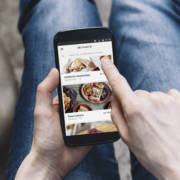When your order arrives, ask the rider to “place the order outside your door and then disinfect the area.” Avoid tipping with cash (as virus-causing germs can linger on paper), and opt for tipping through the app.
Before you start eating, examine the individual containers thoroughly to make sure nothing appears as if it’s been opened or tampered with. You may also wipe down packaging with a sanitizing wipe. After unpacking your food and handling the packaging, wash your hands thoroughly before digging in.
3. Make sure your food is fresh
Jagdish Khubchandani, a health science professor at Indiana’s Ball State University who has studied the impact of viral outbreaks like SARS, said it’s important to pay extra attention to how fresh your food is.
“If I go order fries and they made them two hours ago and they have been staying at room temperature, then it’s dangerous to eat them,” he said. “When food is at room temperature, then you cannot trust that food,” he explained because bacteria grows most rapidly between those temperatures.
4. Get rid of the packaging ASAP
You should toss the packaging your food comes in, especially if it’s plastic. While the hope is that workers are wearing gloves and not coughing or sneezing anywhere near the food they’re packing, there’s no guarantee. Store any leftovers in clean Tupperware or glass containers you own.
5. Refrain from sharing
In general, it’s wise not to share drinks or utensils. Particularly in this current situation, it would be wise not to share food. If you need to split a shared takeout order, divide up the food onto separate plates before eating with your own utensils.
6. Support restaurants, staff, and gig workers in other ways
Restaurants are facing a huge loss in business, and with it, the ability to keep staff employed. If you’d like to help your favorite restaurant weather this storm, you can buy restaurant gift cards or merchandise like shirts and cookbooks to help free up cash flow at this critical time.




